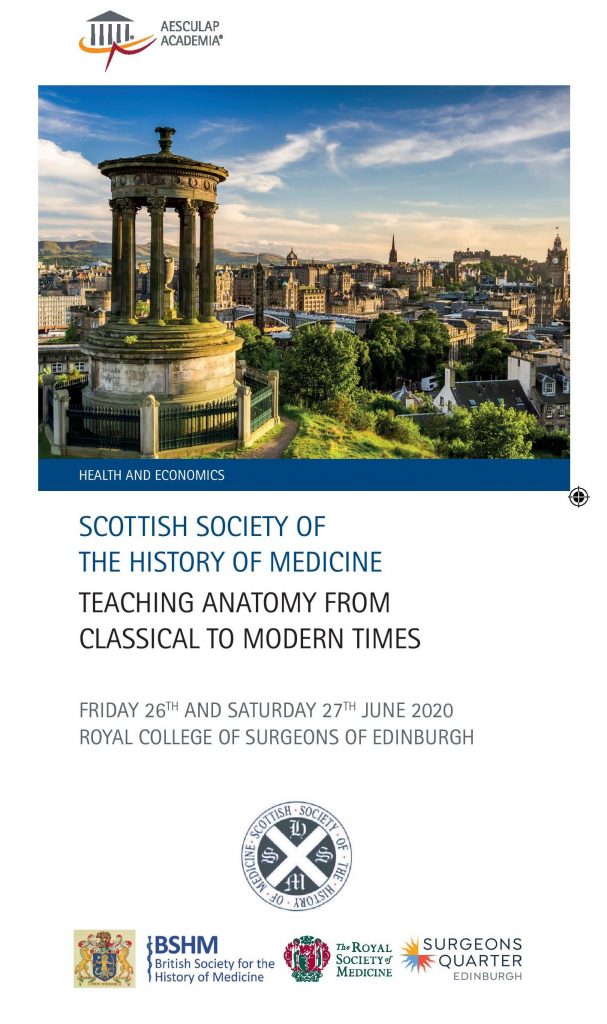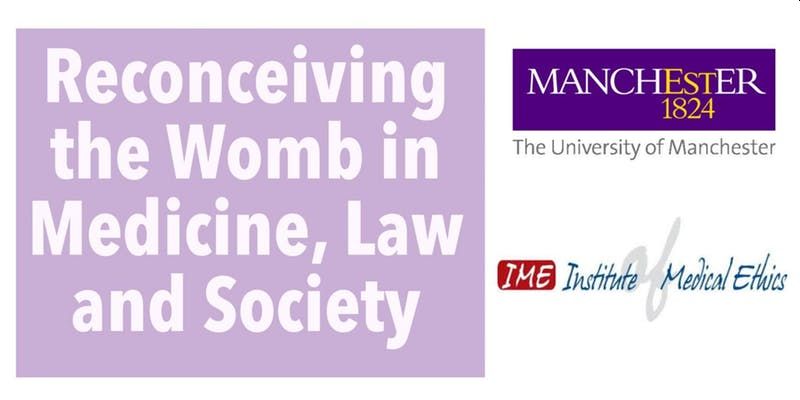SSHM Symposium
This two-day symposium is being organised by the Scottish Society
of the History of Medicine, in association with the British Society for
the History of Medicine and the History Society of the Royal Society
of Medicine. The aim is to explore the development of anatomy
teaching from the earliest times to the present day.
Presentations will cover the ways in which anatomical knowledge has
been acquired, portrayed and taught. We will examine the evolution
of techniques used in the teaching of anatomy through the ages and
its relevance not only to surgery and medicine, but also to art and
society in general.
The programme includes keynote lectures, invited speakers and short
papers. We welcome short papers from a range of perspectives
including historical, social, cultural and modern innovations.
IHR Study Day
Discover research collections at this free one-day event designed for history students, researchers and writers, run by the Institute of Historical Research:
- Plan your next research project
- Meet specialist librarians & archivists
- Hear from historical organisations
- Talk to publishers
- Build your network
The day includes a history fair showcasing over 50 libraries, archives and other historical organisations, offering one on-one advice on your research.
Book now at www.history.ac.uk/historyday

19 November 2019, 10:00am – 4:00pm
Beveridge Hall, Ground Floor, Senate House, Malet Street, London WC1E 7HU
Contact ihr.events@sas.ac.uk
020 7862 8740
Description:
This symposium will explore diverse womb-related developments from the past, present and future, investigating important ethical and socio-legal questions emerging from new and future technologies.
Historically, the womb has featured in medical, social and legal debates about women. A functioning womb saved a woman from the ‘curse’ of barrenness, but also was often blamed for women’s erratic behaviour and used to deny women many opportunities and legal rights. What can we learn from women’s ‘hystories’? Today, attempts are repeatedly made to police pregnancy, interfering with women’s rights on the grounds of fetal health, as the womb is treated as a conflict zone for public health. The womb also is a focus of reproductive futures. Until recently, pregnancy was only possible for a woman born with a healthy womb, but science is facilitating exciting possibilities for gestation such as artificial wombs. Will the womb become a non-binary reproductive organ?
Schedule:
These and other exciting questions will be addressed through three diverse sessions, each encompassing two or three prepared talks followed by a panel discussion.
9.30 – 10: Arrival and Coffee
10 – 10.15: Welcome and Introductions
10.15 – 12: Reflecting on women’s hystories: ‘wandering wombs’ in science and society (Session 1)
12 – 12.30: Coffee Break
12.30 – 2.15: Exploring reproductive autonomy: the womb and evolving attitudes, rights and responsibilities (Session 2)
2.15 – 3: Lunch
3 – 4.30: Speculating about reproductive futures: partial ectogenesis and de-gendering reproduction (Session 3)
4.30 – 5: Close
5 – 6: Wine Reception
Confirmed speakers:
Session 1: Professor Margaret Brazier (University of Manchester), Dr Sarah Fox (University of Manchester) and Caroline Henaghan (University of Manchester)
Session 2: Professor Stephen Wilkinson (Lancaster University), Dr Nicola Williams (Lancaster University) and Dunja Begovic (University of Manchester)
Session 3: Professor Emily Jackson (London School of Economics) and Elizabeth Chloe Romanis (University of Manchester)
Confirmed panellists:
Dr Amel Alghrani (University of Liverpool), Professor Rebecca Bennett (University of Manchester), Professor Susan Bewley (King’s College London), Catherine Bowden (University of Manchester), Professor Emma Cave (Durham University), Dr Alexandra Mullock (University of Manchester), Laura O’Donovan (Lancaster University)
Mon, 4 November 2019 09:30 – 17:00 GMT
The University of Manchester Oxford Road Manchester M13 9PL
Admission free – register via Eventbrite
Instruments of Change exhibition
The University of Manchester has a long history of medical research, teaching and breakthroughs. Instruments of Change highlights Manchester innovations and how the University has helped to shape patient care.
Instruments of Change showcases objects from the Beswick Collection at the Museum of Medicine and Health, stored here on campus in the Stopford Building.
The Museum of Medicine and Health is a collection of historical medical instruments and equipment which form part of the University Collections at The University of Manchester.
Objects are accessed by staff and students for teaching and learning and for use in public events.
Further information can be found in the Instruments of Change FAQ document.
Location
The exhibition is in the entrance to the Stopford Building (number 79 on the campus map).
It’s free to visit and open Monday to Friday 9 am to 5 pm.
NHS at 70
The exhibition is part of NHS at 70, a University of Manchester-led national project supported by the National Lottery’s Heritage Lottery Fund (HLF). It collects stories and memorabilia from people who worked in and were cared for by the NHS since its creation in 1948.
All the stories and memorabilia collected will form part of the first Digital Archive for NHS history. Listen to the stories featured in this exhibition and discover more, including sharing your own story at nhs70.org.uk/stories/IOC.
Contact
Email: medical.museum@manchester.ac.uk
Twitter: @ManMedMuseum
#instrumentsofchangeMCR
BSHM Congress
The BSHM Congress is held on alternate years at venues throughout the UK. In 2019 the Congress will be held at the M Shed in Bristol and will run from Wednesday 11th September to Saturday 14th September 2019.
The Congress is open to all.
The Congress has four main themes: –
– History of Medicine at Sea
– History of Medicine in the West of Britain
– History of Health Care Education
– History of Mental Illness and Mental Disability



